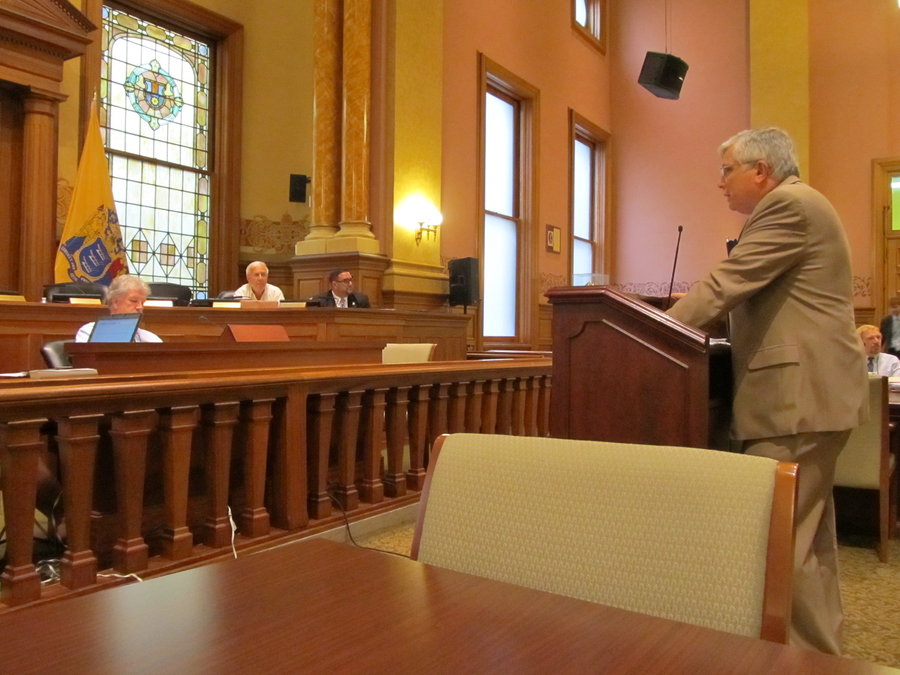Two ordinances that would have revamped the Jersey City Police Department were pulled from the City Council agenda on July 16 at the request of the mayor’s office.
Mayor Steven Fulop submitted the two ordinances in June. One would have established a table of organization for the department that outlined a specific chain of command and specific duties at each level, as well as the desired manpower for each element of the organization.
The second ordinance would put the public safety director at the top of the chain of command.
“The table of organization is designed to enumerate the number, duties, and titles of police division personnel in order to provide stability and predictability within the division of the police,” according to the first of the resolutions.
Fulop says he intends to resubmit these ordinances. But because the administration pulled the ordinances rather than merely tabling them, both will have to be reintroduced, requiring a waiting period and public hearing before they can be passed.
According to Fulop, his reason for demoting Police Chief Robert Cowan was Cowan’s resistance to these changes.
“The selection of Deputy Chief Zacche to lead the Jersey City Police Department speaks to the administration’s commitment to remove the potential of politics in the Police Department.” – Mayor Steven Fulop
____________
New acting chief
Philip Zacche, who has been appointed acting chief, is expected to go along with the changes.
Fulop appointed Zacche on July 21, citing his strong leadership qualities and decades of supervising experience in the department.
Zacche, a 35-year-veteran of the department, has most recently served as chief of the Investigations Bureau and previously served as commander of the North District for seven years until his promotion to deputy chief in 2012.
During his tenure as a supervisor in the department, Zacche has also overseen the Juvenile and Missing Persons bureaus, the Narcotics/Street Crimes Unit, the Robbery/Auto Theft Unit, and the Support Services Bureau. He also served as the patrol supervisor on the midnight tour.
“The selection of Deputy Chief Zacche to lead the Jersey City Police Department speaks to the administration’s commitment to remove the potential of politics in the Police Department,” said Fulop. “Phil will restore morale, build bridges, and improve on best practices for a safer community.”
Zacche will serve as acting chief until the City Council confirms his appointment.
“This is a great move for Jersey City, and I am excited to be working with Chief Zacche and the 35 years of experience he brings to the leadership team,” said Public Safety Director James Shea. “I look forward to tackling the challenges the city is facing together.”
Less is more?
In order to promote more citizen participation in public meetings, the council introduced an ordinance at its July 16 meeting establishing a five-minute time limit on public comments for the second reading of ordinances.
This was proposed by Councilman Richard Boggiano, saying the current unlimited time when speaking on an ordinance often lengthens meetings so that people scheduled to come up later at the regular public comment period leave before they have an opportunity to speak.
The proposal created an odd split among council members that had Council President Rolando Lavarro and Councilman Michael Yun opposing the move. Councilwoman Candice Osborne defended the measure, saying that it would allow others to speak later.
Currently, public comments on ordinances have no time limit, while there is a five-minute limit on comments during the regular public session.
Councilman Khemraj Ramchal proposed a compromise, a seven-minute limit. Lavarro, however, said he is against it because he believes in greater transparency in government.
“While I want to see more participation in a direct way, I would rather see more ways to expand those opportunities,” he said.
Yvonne Balcer, a frequent speaker, said limiting time on ordinance comments is a bad idea, partly because the discussion can involve complex issues which might not be fully explored in five minutes.
She said the council has other ways to shorten meetings, including doing away with the award ceremonies that routinely open meetings.
“There are also too many items on the agenda,” she said.
City council poised to strip Macy’s of its PILOT
The council introduced an ordinance that would terminate the five-year tax abatement for the Macy’s department store because the company failed to file the proper paperwork. If approved, the property would be taxed based on the $9.5 million assessed value and would bring to the city about $400,000 in annual taxes. Macy’s can still avoid losing the abatement by filing the financial statement with the tax assessor, city officials said.
City moves to upgrade anti-virus software for public safety
The council found out during its July 14 caucus that public safety anti-virus software is out of date, setting members scrambling to introduce legislation authorizing an upgrade.
Deputy Fire Chief William Sinnott said the anti-virus protection has not seen a significant upgrade in six years, leaving the communication system for police and fire departments more vulnerable.
“Without upgrading, our software is not as effective as it once was,” he said.
The cost for the overall upgrade is $40,000. The council voted on a resolution to provide the funding at the July 16 regular meeting.
Al Sullivan may be reached at asullivan@hudsonreporter.com.
